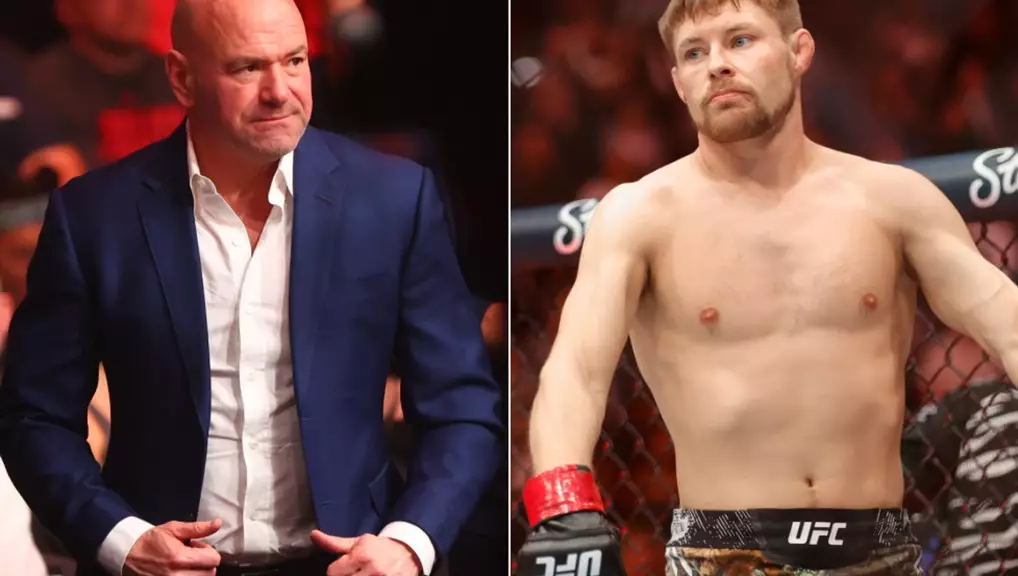In recent days, the mixed martial arts (MMA) community has been rocked by the controversial statements made by UFC fighter Bryce Mitchell during the debut episode of his podcast, “ArkanSanity.” In this episode, Mitchell shockingly expressed admiration for Adolf Hitler and spouted homophobic rhetoric while denying the Holocaust. This disturbing outflow of speech has sparked widespread outrage, prompting UFC President Dana White to respond directly during the Power Slap 11 post-match press conference. White’s strong condemnation highlights the ongoing tensions within the sport regarding personal beliefs and public accountability.
Dana White’s Reactions: A Manager’s Duty
Dana White, typically known for downplaying the significance of fighter misconduct, did not hesitate to express his disgust regarding Mitchell’s comments. “We’re beyond disgusted,” he stated, underscoring the severity of the situation. White’s candidness regarding Mitchell’s diatribe reflects a growing expectation for accountability among athletes, especially those in high-profile positions. He further remarked, “I’ve heard a lot of dumb, ignorant sh*t in my day, but this one’s probably the worst,” illustrating not only his personal disapproval but also the universal condemnation that such views spark.
The gravity of the context is hard to ignore. White articulated the catastrophic historical ramifications of Hitler’s actions, highlighting that the dictator was responsible for the deaths of millions. His eloquence stands in stark contrast to Mitchell’s ill-informed opinions, demonstrating how deeply offensive and damaging such rhetoric can be, particularly in today’s politically charged climate.
While many might have anticipated disciplinary action against Mitchell, White’s response instead pointed toward the complexities surrounding free speech within the realm of sports. “That’s what everyone wants to hear, about punishment, but it’s free speech,” White declared. This response raises crucial questions about the balance between athletes’ rights to express their opinions and the responsibility that comes with being a public figure.
The UFC, a global organization that often faces scrutiny over its fighters’ conduct, appears to be treading cautiously. Despite acknowledging the gross insensitivity of Mitchell’s words, White did not signal any immediate consequences, suggesting that the promotion may choose to separate Mitchell’s personal beliefs from his professional engagements. This dilemma encapsulates the inherent challenges in maintaining a clear boundary between free speech and the repercussions that come with incendiary remarks.
Another troubling aspect of Mitchell’s statements is tied to the homophobic rhetoric he employed during the podcast. Such views not only alienate segments of the audience but can also contribute to a broader culture of intolerance. As the fight for inclusivity in sports continues, remarks of this nature serve to undermine these efforts. White’s remarks about Mitchell being “one of the dumbest human beings” reflect a mounting frustration within the industry towards those who perpetuate harmful stereotypes or espouse bigoted views.
This episode shines a glaring light on the challenges that organizations like the UFC face as they navigate the evolving cultural landscape. The MMA community, long criticized for its machismo and at times, regressive attitudes, must engage in serious introspection to foster an environment that is welcoming to all.
As of now, Bryce Mitchell’s position within the UFC remains unchanged. After a mixed performance of 2-2 in his last four bouts, his recent victory over Kron Gracie at UFC 310 showcased his athletic ability—but his controversial comments may overshadow his fighting prowess. Dana White stated, “For all of you that hate Bryce Mitchell, you get to hopefully see him get his ass whooped on global television,” implying that audiences can expect to see both support for and criticism of Mitchell in the Octagon.
However, this scenario raises important questions about long-term consequences. As fans and industries demand change and accountability, fighters like Mitchell may find it increasingly difficult to maintain their careers amidst public backlash—and rightly so. The sport must progress beyond tolerance for intolerance if it wishes to capture a more diverse audience.
Ultimately, the controversy surrounding Bryce Mitchell serves as a wake-up call for both the UFC and the wider sporting community. As the lines between personal beliefs and public conduct blur, it becomes incumbent upon organizations to set definitive expectations. As Dana White himself noted, society has provided platforms for “dumb, ignorant people.” It is high time for the UFC and other similar entities to leverage their authority to champion not just free speech but also the values of respect, empathy, and inclusivity that ought to be at the core of their missions.
In this age of social media, the repercussions of harmful dialogue are amplified, and as such, the responsibility lies with both fighters and their organizations to foster a discourse that uplifts rather than tarnishes the dignity of others. The time for actionable change is now, as the sport grapples with the dark shadows of history and the bright potential for a more inclusive future.

